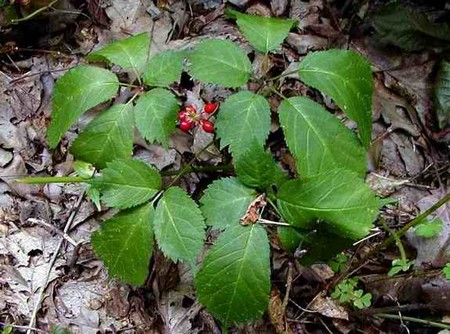Ginseng is familiar to many as a wonderful tonic to increase energy and vitality, improve mental and physical performance and protect against the effects of stress. The name ginseng is used for a number of different plants including Panax ginseng. Chinese or Korean ginseng, Eleuthrococcus senticosur. Siberian ginseng, and Panax quinqiiefolinm: American ginseng.
In Northern China Panax ginseng grows in the mountainous forests, allegedly only where lightning has struck a clear stream. It was noted in 1709 by Father Petrus Jartoux, a Jesuit missionary in North China. He said that if this wonder plant were to he-found anywhere else in the world it would be in Canada where the forests and mountains resemble those of North China. Another missionary, Pere Joseph Francois Lafitau, discovered Panax quinquefolium growing outside his Montreal cabin in 1716. Very soon American ginseng was being shipped from Canada to China. The practice continues to this day.
Herbal remedy
The word Panax comes from the Greek pan meaning all, and akos meaning cure, referring to ginseng’s traditional use as a cure-all or panacea. In China this famous tonic has been used for Qi deficiency associated with debility, insomnia, weakness and breathlessness, which may be caused by stress, illness, or ageing. Over the past 50 years nearly 3000 scientific studies have demonstrated ginseng’s amazing ability to increase resistance to mental and physical stress in many different forms. It has been described as an adaptogen, having a normalising action in the body, which may for example be relaxing in a person feeling tense and anxious, and stimulating in someone feeling tired and lethargic. Ginseng acts on the pituitary gland and stimulates the adrenal glands, normalizing their function during the challenges of stress. By increasing the efficiency of nerve impulses, ginseng increases mental performance, sharpens memory and diminishes fatigue. It improves physical performance, increasing stamina locally in the muscles. It reduces wheezing and shortness of breath.
By increasing white blood cell action ginseng acts as an immune enhancer. It reduces blood sugar, which is useful for diabetics, improves the appetite and digestion, lowers harmful cholesterol and decreases allergic responses. The saponins stimulate sexual function in both men and women, and increase sperm production in men. Ginseng also helps the liver resist heparotoxins and radiation and reduces the depression of the hone marrow in those on anti-cancer treatment. Ginseng thus raises resistance to stress, increasing the threshold over which stress is challenging and becomes damaging. It can be taken on a short-term basis for 3—4 months during a particularly stressful period. It can also be taken by the elderly as a rejuvenating tonic — the presence of antioxidants in ginseng will support this action.
American ginseng is more tranquilizing and cooling than Panax ginseng. It has been used in /America for treating TB and more generally it can be used to strengthen one in the aftermath of a high fever when feeling weak, thirsty and debilitated or when suffering from after-pains after childbirth.
Homeopathic remedy: panax
Ginseng gives a sense of joy, vigour and elasticity of the limbs and clearness of mind in cases of physical and mental fatigue. It has an affinity for the lower part of the body and is specific for lumbago, sciatica, chronic rheumatism and sexual over-excitement.
The flower essence
The root of American ginseng has a human shape, and the flower essence imparts a strong awareness of what it means to be a human being. It engenders a blending of both male and female energies, creating a unity within. It is in every way a strengthener — mentally, emotionally and physically. It protects against the effects of stress and has a beneficial influence on the endocrine system. When used in massage oils ginseng increases physical stamina, and helps to connect the spiritual side of oneself to the physical. It is a great tonic.

